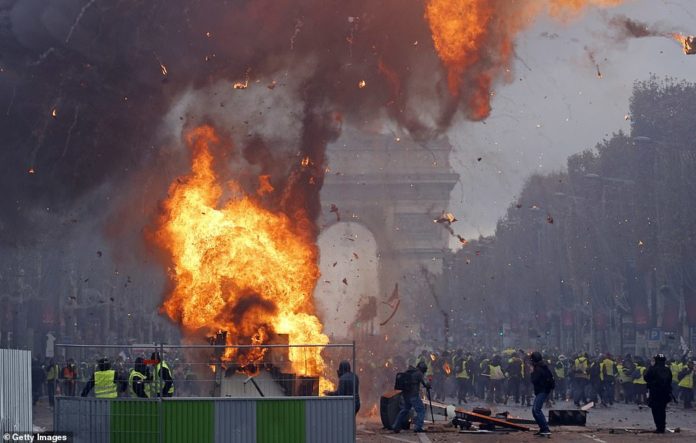

Paris is BURNING:
Huge bonfires are lit on the Champs Elysee in Paris as police blast thousands of people with water cannon and tear gas as they protest proposed fuel hikes
The worst violence took place in Paris where a huge crowd called for President Emmanuel Macron to resign
Fires rage along Champs Elysee as 106,000 across France demonstrated, some clashing with the police
Demonstrators, part of grassroots movement dubbed ‘yellow vests’, were rallying against the fuel tax hikes
Two road deaths have been linked with protests so far, both at illegal road blocks set up by the yellow vests
Huge plumes of smoke were seen on one of France’s most iconic streets today, as protesters burned large plywood sheets, chairs and other material in demonstrations against planned fuel hikes.
A water cannon and rounds of teargas were also used by riot police against thousands of French ‘Yellow Vest’ fuel protesters in Paris today as the Champs Elysee was reduced to a battlefield.
The grassroots movement is campaigning against a what is believes to be a general decline in living standards across the country, and the recent decision to raise fuel prices.
The worst violence took place on the most famous avenue in the city where a huge crowd called for President Emmanuel Macron to resign.
By 11am, clouds of tea gas covered the Champs Elysee, and especially the area close to the place de la Concorde.
By mid-afternoon, 106,000 protesters had been counted across France, compared with about 244,000 at the same time last week, figures from the interior ministry showed.
Around 8,000 took to the streets in Paris, with about 5,000 on the Champs-Elysees.
‘They included hooded demonstrators who were determined to cause trouble,’ said a police officer at the scene.
‘We’ve been forced to deploy a water cannon and used tear gas to stop them getting to a secure zone.
‘They’re breaking up traffic obstacles to create missiles to throw at us. It’s getting very violent.’
The zone included the Elysee Palace – Mr Macron’s official home – and the Place de la Concorde, opposite the National Assembly, France’s parliament.
The Yellow Vests – gilets jaunes in French – are named after the high visibility jackets that they wear, and are conducting a grassroots campaign against escalating petrol and diesel prices.
A hundred and thirty people were arrested, 42 of those in Paris, and 24 people were injured, five of them police officers including one who suffered burns to his groin, the city police department and Interior Minister Christophe Castaner said.
Elsewhere, protesters took over highway toll booths to let traffic pass for free, or held go-slow vehicle processions, underlining one of their core complaints of escalating taxes on car fuel, especially diesel.
A week ago, two people died and over 750 people, including 136 police officers, were injured in sometimes violent demonstrations that have shone a light on frustrations in any rural areas and small towns of France.
The ‘yellow vests’ hail overwhelmingly from non-urban areas of France and feel they have been overlooked and penalised by policies they see as being pushed through by elitist politicians in Paris.
Former investment banker Macron was elected on a pledge to put more money in workers’ pockets, but the effects of his pro-business reforms on unemployment and purchasing power have been limited so far.
Many of the often low-income ‘yellow vest’ protesters are particularly incensed at his decision to hike anti-pollution taxes on diesel, while scrapping a wealth tax on the rich.
Protester Catherine Marguier said at a pay booth on the A81 motorway near the village of La Gravelle in northwest France: ‘I’m not just fighting against the price of fuel. It’s about tax, what we pay.
‘People can’t handle it any more. We need to change the government, the people at the top’, she said.





